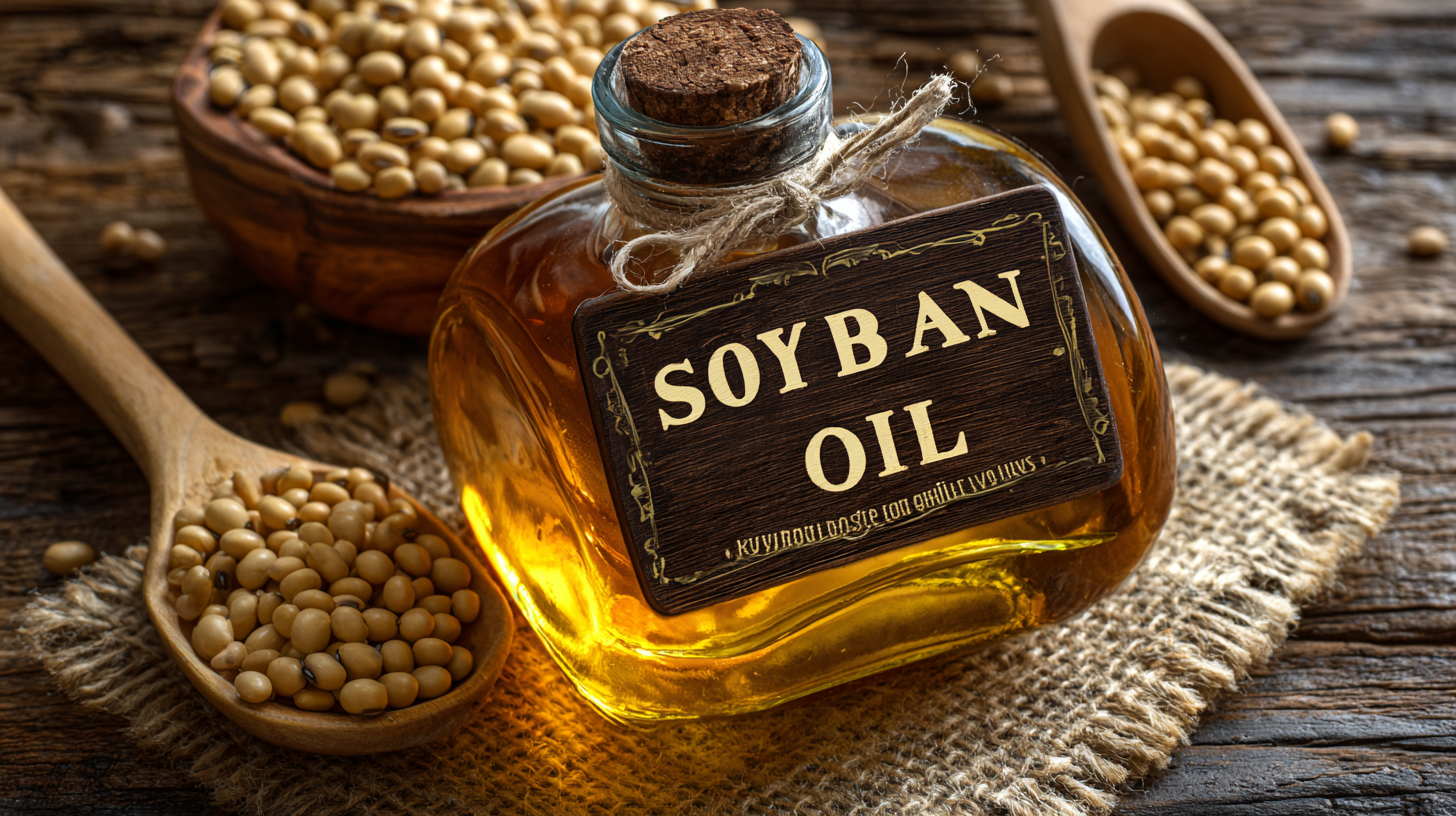
News
Unlocking the Health Benefits of Best Soybean Oil: A Global Perspective on Nutritional Value and Quality
Soybean oil, derived from the seeds of the Glycine max plant, is a cornerstone in both culinary and industrial applications worldwide. As one of the most widely consumed vegetable oils, it accounts for nearly 34% of global edible oil production, according to a 2022 report by the Food and Agriculture Organization (FAO). The oil's favorable fatty acid profile, rich in polyunsaturated fats, contributes to heart health, while its high smoke point makes it ideal for various cooking methods.
 Moreover, recent nutritional studies have highlighted the potential of soybean oil in providing essential omega-3 and omega-6 fatty acids, critical for optimal health. With China's manufacturing prowess and export capabilities, the production of high-quality soybean oil continues to rise, meeting the demands of an increasingly health-conscious global market. This blog will delve deeper into the health benefits and nutritional value of the best soybean oil, offering insights into its quality and impact on global dietary trends.
Moreover, recent nutritional studies have highlighted the potential of soybean oil in providing essential omega-3 and omega-6 fatty acids, critical for optimal health. With China's manufacturing prowess and export capabilities, the production of high-quality soybean oil continues to rise, meeting the demands of an increasingly health-conscious global market. This blog will delve deeper into the health benefits and nutritional value of the best soybean oil, offering insights into its quality and impact on global dietary trends.
Exploring the Nutritional Profile of Soybean Oil: Key Vitamins and Minerals
Soybean oil is not only a versatile cooking oil but also a nutrient-dense source of essential vitamins and minerals. Rich in vitamin E, soybean oil contains approximately 1.9 mg of tocopherols per tablespoon, contributing to antioxidant properties that can help combat oxidative stress in the body. Research published in the Journal of Food Science indicates that the high concentration of polyunsaturated fatty acids in soybean oil can play a crucial role in heart health by lowering bad cholesterol levels while raising good cholesterol.

Additionally, soybean oil is a significant source of omega-3 fatty acids, which are vital for brain health and reducing inflammation. The U.S. Department of Agriculture (USDA) highlights that a single serving of soybean oil can provide up to 7% of the daily recommended intake of alpha-linolenic acid (ALA), a key omega-3 fatty acid. Furthermore, soybean oil's balance of omega-6 to omega-3 fatty acids is roughly 7:1, aligning with dietary guidelines that promote a healthier ratio for optimal wellness. By incorporating soybean oil into your diet, you benefit from a source of essential nutrients that support overall health.
The Role of Soybean Oil in Promoting Heart Health and Reducing Cholesterol
The role of soybean oil in promoting heart health has garnered significant attention, particularly in light of recent studies highlighting its potential benefits. Research indicates that soybean protein, especially in varieties high in B-conglycinin, may be effective in reducing LDL cholesterol levels, comparable to traditional statin medications. This aligns with findings suggesting that incorporating plant-based oils like soybean oil can improve cardiovascular health by lowering risk factors associated with heart disease.
Further emphasizing the efficacy of healthy fats, studies have shown that replacing saturated fats, such as those found in butter, with unsaturated fats from oils like soybean can reduce the risk of chronic conditions, including diabetes. The benefits of such dietary shifts are underscored by health experts advocating for the prioritization of healthy fats to mitigate risks of heart disease and cancer. Notably, the recent approval for soybean oil to be labeled as heart-healthy by regulatory authorities reinforces its role as a valuable dietary fat for heart health, despite ongoing debates about the safety of various seed oils.
Unlocking the Health Benefits of Best Soybean Oil: A Global Perspective on Nutritional Value and Quality
| Nutritional Component | Amount per 100g | Health Benefits |
|---|---|---|
| Calories | 884 kcal | Provides energy for daily activities |
| Total Fat | 100 g | Essential for hormone production and cellular health |
| Saturated Fat | 15 g | Moderate intake linked to heart health |
| Monounsaturated Fat | 58 g | Helps reduce bad cholesterol levels |
| Polyunsaturated Fat | 27 g | Includes omega-6 fatty acids beneficial for heart health |
| Omega-3 Fatty Acids | 7 g | Supports brain health and reduces inflammation |
| Vitamin E | 14.5 mg | Antioxidant that promotes skin and eye health |
Global Trends in Soybean Oil Production and Its Impact on Quality
The soybean oil market has experienced significant changes in recent years, driven by global trends that influence its production practices and quality. As consumers become more health-conscious, the demand for high-quality soybean oil has surged, prompting producers to adopt advanced techniques that enhance the oil's nutritional profile. Regions such as the United States, Brazil, and Argentina have refined their agricultural practices to ensure better yields and a higher concentration of health-beneficial compounds, like omega fatty acids and antioxidants, making their soybean oil more appealing on the international stage.
Moreover, sustainability has become a focal point in soybean oil production. As countries grapple with the impacts of climate change, many producers are implementing environmentally friendly farming methods. This shift not only helps in improving the quality of the oil but also addresses consumers' growing concerns over sustainability. For example, practices such as crop rotation and reduced pesticide usage are being adopted, contributing to a more robust and nutritious soybean oil. This evolution in production is crucial in meeting the global demand while ensuring that the end product remains beneficial for health, all while keeping an eye on the planet's future.
Sustainability Practices in Soybean Farming: Benefits for Health and Environment
Sustainability practices in soybean farming play a crucial role in enhancing both health and environmental outcomes. By adopting methods such as crop rotation, reduced pesticide use, and organic farming, farmers can cultivate soybeans in a way that not only preserves soil health but also minimizes the carbon footprint. This approach not only contributes to higher nutritional quality of the soybean oil but also promotes biodiversity, fostering a healthier ecosystem.

Moreover, sustainable soybean farming practices often lead to the production of high-quality oils that are rich in beneficial nutrients such as omega-3 and omega-6 fatty acids. These nutrients are vital for heart health and overall wellness. As consumers become more health-conscious, the demand for sustainably produced soybean oil grows, encouraging farmers to continue these practices. This shift not only supports the health of the population but also helps safeguard the planet for future generations, reinforcing the interconnectedness of sustainability, health, and quality in our food systems.
Comparing Soybean Oil with Other Cooking Oils: A Nutritional Overview
When it comes to cooking oils, soybean oil stands out due to its unique nutritional profile. According to the U.S. Department of Agriculture (USDA), soybean oil contains approximately 58% polyunsaturated fats, which include essential omega-3 and omega-6 fatty acids. This makes it a heart-healthy option compared to saturated fat-rich oils like coconut or palm oil. Furthermore, soybean oil has a high smoke point of around 450°F (232°C), making it ideal for frying and high-heat cooking, while still retaining beneficial nutrients.
In comparing soybean oil to other popular cooking oils, such as olive and canola oil, it is important to consider the balance of fatty acids. A study published in the Journal of Nutritional Biochemistry highlighted that soybean oil provides a healthier ratio of omega-3 to omega-6 fatty acids compared to olive oil, which is predominantly monounsaturated fat. This balance plays a crucial role in reducing inflammation and promoting overall heart health.
**Tips:** To maximize the health benefits of soybean oil, consider using it in salad dressings or marinades to ensure you're getting the nutrients without the harmful effects of excessive heat. Additionally, incorporating a variety of oils in your cooking can provide a broader spectrum of fatty acids, so don't hesitate to blend soybean oil with other oils for flavor and health benefits. Lastly, always check for high-quality, non-GMO soybean oil options to ensure you’re consuming the best available product.





